
Let me be the first to say it:
Morning Show Boot Camp is back.
(And perhaps so are in-person conferences.)
It felt excessively normal yesterday at Day One of MSBC33. Credit to Don Anthony. He sensed that many of his attendees wanted to do this. I served up a brief survey for him in April, and respondents told us they wanted this gathering.
Of course, we did the research as the vaccine rollout was hot and heavy, and before we had a clue about the Delta variant. Nonetheless. Don persevered, and a great crowd filled a ballroom yesterday at the Swissôtel in Chicago. (Day Two is today.)
While there was the prerequisite “Battle of the Bits,” yesterday was a day of thoughtful panels and sessions. I was honored to kick off MSBC33 with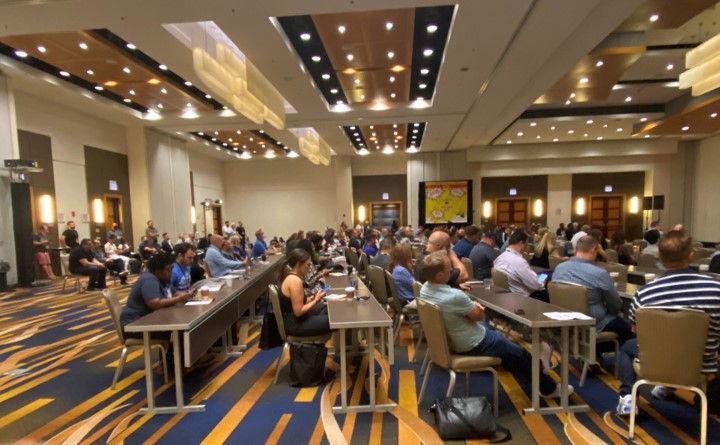 the results of AQ3, the talent survey we do in collaboration with Don and Boot Camp.
the results of AQ3, the talent survey we do in collaboration with Don and Boot Camp.
I present a lot of research every year, and without a doubt, the Boot Campers are the most attentive audience that sits through my “data dumps.” They are a true community, supporting each other through good times, bad times, and times like these.
I can tell you no one was texting or posting on social media while I hit them with slide after slide. They were riveted on the results. And this year’s findings were sobering – starting with something as mundane as the sample size.
Only 600 personalities (and producers) from commercial radio in the U.S. took part in AQ3. You may raise an eyebrow at that – after all, that’s a solid N-size under most circumstances. For a relatively compact group like air talent, it’s more than enough.
But when you consider our first two AQ studies – fielded at about the same time of year in 2018 and 2019 using the same outreach tactic – yielded just over 1,000 respondents each, something’s up.
Of course, the radio business – like most industry sectors – doesn’t have a “census.” There’s no way of knowing how many jobs were lost in 2020 (and 2019) due to COVID and other “reductions in force” that aren’t coming back. But my first conclusion yesterday is that at a time when if you asked leadership at the competition – Pandora, Spotify, SiriusXM, etc. – to name broadcast radio’s “secret sauce,” I’d bet that personalities would be at or near the top of their checklists. And yet, talent in radio is a shrinking breed at a time when the industry needs to recapture attention and buzz. And respect.
And of course, everyone on the air is impacted – especially women. That’s because in past years, we’ve seen the ugly numbers – men outnumber women 3-to-1 on the U.S. airwaves. And this year was no exception.
But our data also identified that women are losing ground at radio stations all over the U.S. – in all sized markets and companies. The #MeToo movement seems to have lost some momentum. Similarly, on the question of whether women have as good a chance advancing on the air as men, the degree of agreement is lower than what we saw back in 2019 in AQ2.
But here’s the kicker – the gap between how both sexes view a woman’s chance to move up on the airwaves is dramatic, as you can see on the “Venus & Mars” chart below:
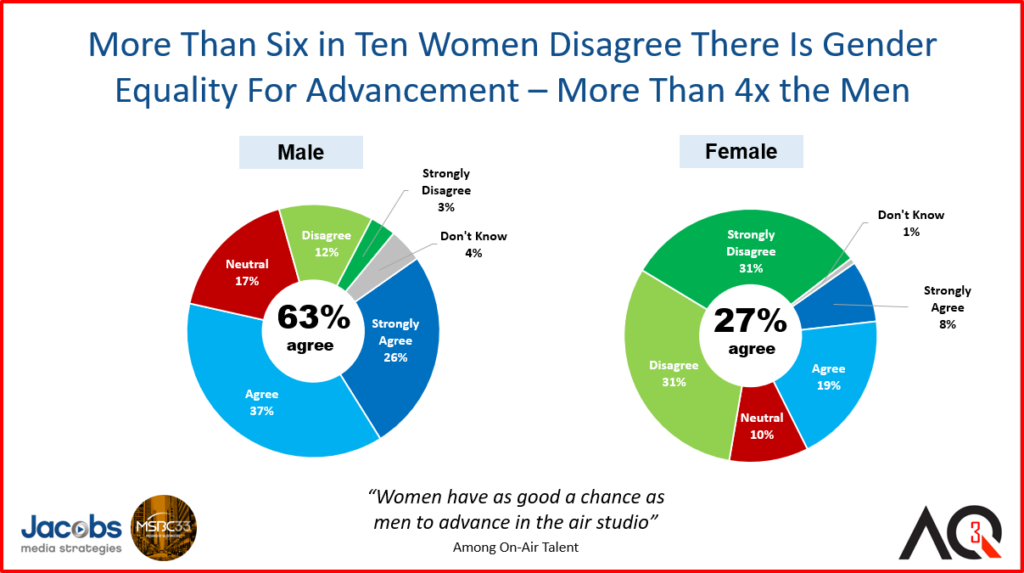
It’s unusual when a single chart from a long survey tells this vivid a story. But in many ways, the AQ3 data set the table for what was to come.
In the annual Women’s Forum, aptly named this year – “Breaking the Glass Ceiling…and Beyond” – a half dozen highly accomplished women were led by industry vet Charese Fruge in a wide open, no holds barred discussion of the way it is.
The session was well attended – overwhelmingly by women – but there were some men in the room leaning into the conversation, too. And the panelists acknowledged and thanked them for engaging.
There were more applause lines than in a typical political campaign speech. Both attendees and panelists seemed to feed off each other, especially during the Q&A.
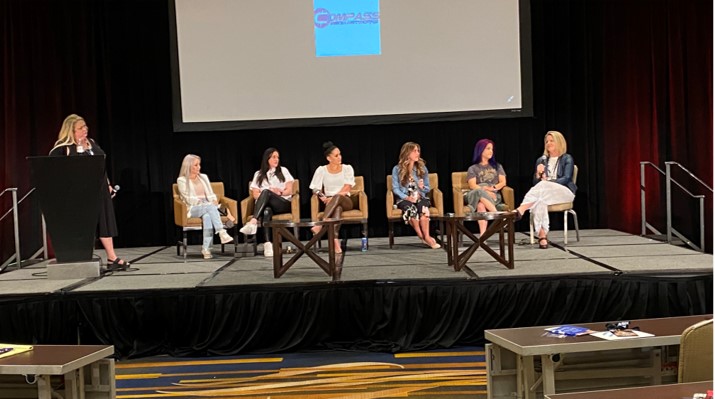
There were some strong moments during the session as the women told their stories of what it was like – and in many cases, what it is still like. And not only were attendees in the Zurich Ballroom nodding in agreement, the data confirms their perspectives as well.
Why aren’t there more women program directors was one of Fruge’s jump ball questions. And while each woman gave their theories, the data suggests to me that until there are more female air talent in prominent roles, the PD pipeline will remain dry. After all, most program directors come from the air studio. More women on the air at least opens the door for more PD promotions.
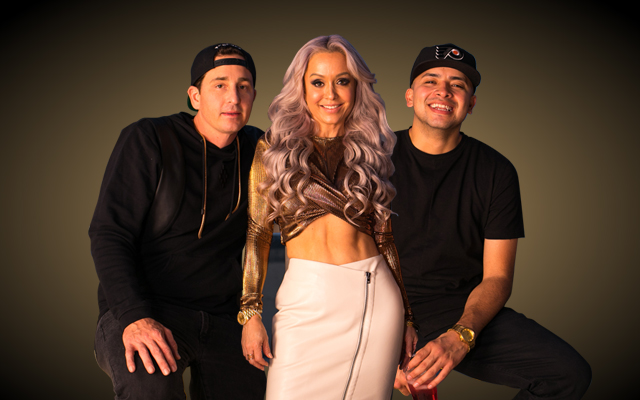 Syndicated morning star, Dana Cortez, was especially generous with the high’s and low’s. Even at this point in her storied career as both a woman and Mexican American syndication success, she continues to encounter blatant sexism – and ignorance – in her dealings with less enlightened broadcasters.
Syndicated morning star, Dana Cortez, was especially generous with the high’s and low’s. Even at this point in her storied career as both a woman and Mexican American syndication success, she continues to encounter blatant sexism – and ignorance – in her dealings with less enlightened broadcasters.
Cortez thanked her team, from the screeners to the engineers, noting that everyone plays a key role in making her show a success. But when she considered the overall environment for women, she commented:
“We need men to be there for us.”
And that comment spurred Tyrene Jackson to step up to the mic during Q&A, look around the room, and lob this prescient response:
“How do we create change when men don’t come to the party?”
That is the question, and everyone on stage and in the seats sensed it.
Tyrene – or T.J. – has a great story of her own. A graduate of the University of Wisconsin-Whitewater, she has worked her way up to become a talk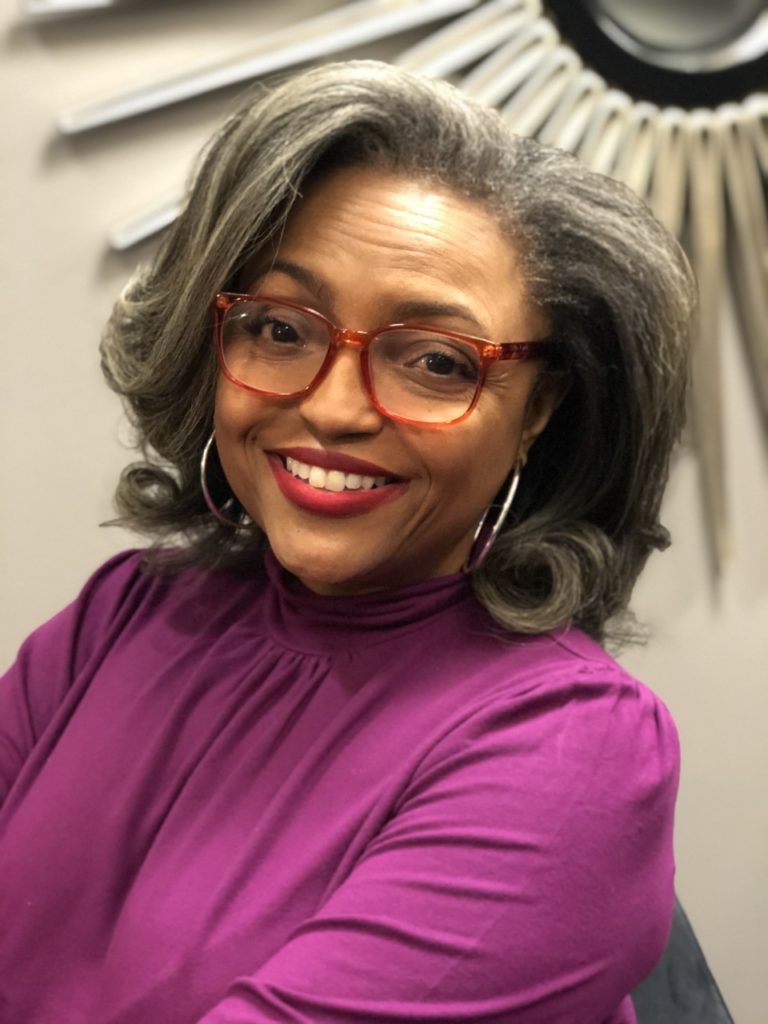 show host, PD, and Operations Manager at several stations. She has launched her own online talk show, worked for SiriusXM, and is now Executive Producer for the syndicated show, “Get Up Mornings” with Erica Campbell.
show host, PD, and Operations Manager at several stations. She has launched her own online talk show, worked for SiriusXM, and is now Executive Producer for the syndicated show, “Get Up Mornings” with Erica Campbell.
T.J.’s trajectory confirms there’s a path for talented, motivated female personalities who won’t be discouraged or denied. But as her question suggested – and the panelists affirmed – men need to not only attend these sessions, but also develop a finer understanding of the environment – then and now.
Broadcast radio is at an inflection point – please excuse the cliché – where contributions are necessary from all corners.
But of course, it starts with showing up.
My wish is that at MSBC 34 – hopefully, another in-person conference – we see more of radio’s C-suiters in attendance. Personality is the industry’s most important resource. Our AQ3 data – and Boot Camp – suggest the need for more leadership engagement from the highest levels.
And as parties go, this is a pretty damn good one.
Of course, I bet Art Vuolo would sell you the video. [email protected]
I’ll be presenting the full results of AQ3 – radio’s only talent survey – on Wednesday, August 25 at 2pm ET. The webinar is free. Bring the airstaff – and your GM. Info/registration here.
- Media And Technology In 2025: Believe It Or Not! - April 18, 2025
- In Radio, You Just Never Know - April 17, 2025
- The Secret To Making A Great Podcast (And Great Radio) - April 16, 2025




Fred,
I woman I worked with broke into the business doing nights on a CHR in the 80s, the station, despite her numbers and ambition would not promote her into a daytime shift, she left the station after 5 years, did a midday shift (a job I hired her for) at another station, then afternoon drive. She was then hired as a morning co-host at an AC. Her male counterpart treated her like sh#t, never the less she persisted. The guy got a new gig and left. She did the show on her own for 8 months while the smart guys looked for another guy for the show. During the months on her own, the numbers went up and up and up. The big brains down the hall dug up another creep and he treated her as badly as her first partner did. The numbers went down. She got fed up and left. She’s doing voice-over now and making a good living. The station has run through three guys since she left and they have no clue why their morning show tanked.
Thanks for that story, Robert. I’m betting a lot of people read your comment and nodded right along.
Until the higher-ups stop treating women as JUST “side-kicks” or only worth being a mid-day talent; the radio veterans (that’s what women are) will not be heard for ideas and the experience they’ve earned. Too many women have worked hard during their careers and still don’t get recognized for their abilities.
Fortunately, now, after 30+ years, I work for a company that sees me as valuable.
Ellen K is doing just fine without Ryan Seacrest to “prop” her up. She’s the number one moring man in LA
Thanks for this, Lara. It’s coming, it’s taken too long, but it’s coming. Thanks for chiming in.
As a woman in the business for 35 years, I appreciate this article and the forum at the boot camp.
To get men to the forum and beyond, it takes men telling men to show up. Then the men who told the men to show up must show up themselves. And then follow through.
I’ve worked for a few companies, and since the mid 90’s they all TALK ABOUT how women inclusive they are. They have meetings to talk about their including women, then they point to me as an example.
I am LITERALLY the only full-time FEMALE announcer in my market. We have 15 or so stations in this market, and I am the ONLY female programmer working full time. Then, there is a gal who does sales, that is half of a morning show. But she does NOTHING ELSE. No production except a couple of her clients, rare appearances, etc.
The female employment numbers in radio come, mostly, from SALES. I noticed in the mid to late 90’s that they were getting away from the Howard Tarleks in the sales department, and hiring, mostly, young women. Back then, it wasn’t scandalous for our male GM, and they were always male until the early 2000’s, to brag to everyone that the short skirts were the secret to making goal. The bragging has stopped, but the only male on our sales staff is the GM.
With COVID, I fear for the females in this industry. Since I’m the only one here, I have a fairly safe spot in the general workings of our group. BUT to get SAFE I had to take 2 stations to program, part prod director, and 3 full time airshifts a day and another on the weekend.
Lets get to hiring a woman to train. When I took my second station here, the voice tracked man on afternoon drive was awful! AWFUL. He didn’t even say the CALLS sometimes! It took MONTHS, but I finally got him off the station. Fast forward to 2 years later. I’m trying to bring in a female for a ft shift. She actually has more experience than the previous afternoon drive guy and much more of a grasp of the ins and outs of a shift. Somehow, she doesn’t pass with corporate. KEEP IN MIND that a year ago, they fired my mid day guy on my OTHER station because of Covid, and they had NO PROBLEM with me putting a part timer on FULL TIME and training him on the job. How come the standard for “being good” is different for the 2 of them? The only honest conclusion I can come to is because one is female. Their shows are about equal in quality.
The other thing about COVID is it’s forcing a lot of mom’s to decide between their kids health and safety or going to work. A lot of times, you can VT and do some prod from home, do music logs and work on promotions, but they aren’t going to give the same pay. I’m generalizing that, but it’s the whispers I hear from other broadcasters.
Finally, the shine of #METOO has worn off, and the ones who reveled in it before, are beginning to feel comfortable again.
I feel like every time I comment on an article it’s just one big complaint. It’s not. I’m just hoping that this is somewhere in your mind when speaking of this to the people who make real change in the business. Thanks for always listening and forwarding new ideas.
Tammie, I appreciate these comments and I empathize. It’s tough out there, especially in smaller markets where ever hire (and fire) has extreme impact on the station. Everyone’s wearing a lot of hats, and a lot can go wrong. Thanks for the story.
You could only wish what you’ve written, Tammie, was required reading by all radio corporate executives, if not everyone in radio. If radio doesn’t “get this,” then, well, maybe it deserves whatever happens to it.
Thanks for weighing in on Tammie’s comment, Dave.
Great shrieking Jesus on a Roomba!
I just wanna jump out of my first floor window and end it all…
It’ll all work out, Max. Always does.
Is there a deeper issue here? Women want men to be there for them. As we can see the lip service is easy and worse, it is hollow. What does that actually mean? In spite of appearances and all the chatter about the dreadful and fearsome “Patriarchy”, men aren’t actually there for each other either, especially in a competitive environment like ours. It might be too much of a reach to expect anyone to give a leg up to anyone who might be after your job. After the Big Wave of Consolidation a lot of jocks found themselves out of work. Of course when men dominate the booth most of the casualties are in fact men. And since COVID the trend is not in favor of more jobs overall. Even in VT. Ask anyone, any of the unfortunate unemployed.
My logic is inscrutable. But it still sounds selfish. And if you look at really successful people they are very generous in sharing themselves. Who do you want to be?
What is coming in the future? I could offer up the famous Yogi Berra quote about predictions.
I don’t think it matters who you are. Study success. There’s a lot to say about business savvy, but the rubber meets the road in presentation. Take Ellen K. Listeners in total don’t care whether she broke a glass ceiling or anything else. That goes by in a blink. We, the insiders, are concerned with that angle. What is the nature and the nuance of the character she presents? What is the invisible key to her mass appeal? Clue: it’s not all about being female or any other single thing. Get over the category thing. Think “mass appeal”. Was anyone except us under the impression that she was being “propped up” by Seacrest? We’re not immune to our own BS.
As an industry we still have a long way to go to get to the vaunted realm of equality. We’re gonna have to break down a lot of dysfunctional precepts. It’ll be worth it.
Lalo, I love this comment and its cold truth. It should make us all think about who we are, our roles, and our aspirations. I am especially thinking about this idea of “sharing ourselves.” Thanks so much for engaging on this topic, so important to the continued health (or lack thereof) of the industry. And I’m also focused on “We’re not immune to our own BS.” No, we’re not.